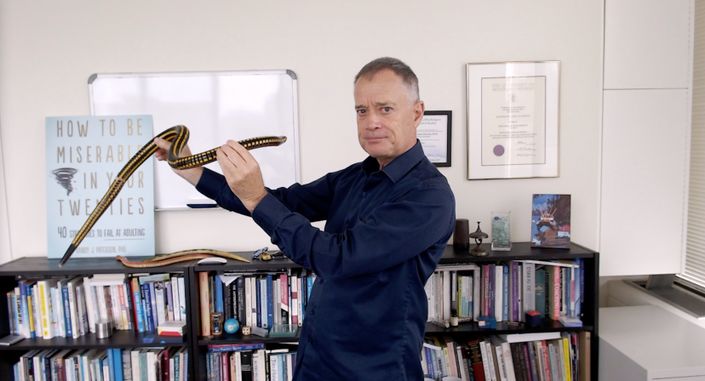
Exposure Therapy for Anxiety Disorders
A Course for Mental Health Professionals
Watch Promo Enroll in Course
Most of what we call anxiety disorders have two components: Anxiety and avoidance. By defining the problem as anxiety, we divert attention from the true driver of these difficulties - the avoidance. Avoidance brings relief from anxiety, and relief brings more avoidance. It is often a client's attempt to manage their anxiety that explains why a problem has grown to overwhelming proportions.
Enter exposure therapy - one of the oldest, best researched, and most established of psychotherapeutic interventions. Bypassing anxiety management (for the most part), exposure therapy targets avoidance, supporting clients' abilities to face their fears a bit at a time, building confidence and capacity along the way.
Virtually every clinician will encounter clients for whom exposure therapy is indicated. Yet the specifics of this intervention are seldom taught in clinical training programs with the precision they merit. As a result, the power of exposure in the management of anxiety and avoidance is muted or lost entirely.
This course provides the details of best practices in exposure therapy for a variety of common client presentations, including:
- Specific phobia. Fears of heights, enclosed spaces, driving, insects, animals, water, medical procedures, blood, sounds, locations, flying, and other stimuli are tremendously common - and they represent one of the most common aftereffects of traumatic experiences such as motor vehicle and workplace accidents.
- Social anxiety. Fears relating to the judgements of others can be debilitating, preventing individuals from socializing, performing, doing public speaking, taking job interviews, shopping, setting boundaries, and much more. Social anxiety can be a major contributor to difficulties launching into adult independence.
- Obsessive compulsive disorder. Most people have traces of obsessive compulsive behaviour, but for some the problem grows out of control and takes over their lives. Rituals can occupy much of every day, and the avoidance of triggers can lead to a markedly restricted existence.
- Panic disorder. Panic attacks are common but overwhelming experiences, and the fear of panic can increase their frequency. Many clients are beset by multiple attacks each week, seeking out medical attention and fearing death. The attempt to avoid triggers becomes a defining feature of their life.
- Agoraphobia. Often appearing in conjunction with panic disorder, agoraphobia involves a broad pattern of avoidance of situations from which escape might be difficult, or where help might not be forthcoming. Individuals with agoraphobia can become partially or completely housebound, unable to work, shop, socialize, or carry on fulfilling relationships.
- Subclinical fears. Whether or not a diagnostic threshold is crossed, many clients find themselves beset by fears that make coping with the other demands of life difficult.
The course discusses the nature of stress and anxiety, the way that fears spiral out of control, and the primacy of avoidance. It presents step-by-step procedures for identifying the true fear the client is experiencing, ways of generating a wide range of exposure therapy exercises, and the collection and organization of these exercises into a structured hierarchy. You will learn a series of strategies for conducting in-office and field-trip exposures, as well as techniques for helping clients carry out home practice exposures.
You will receive: Ongoing access (without expiry date) to all video lectures and materials, a pdf of the text slides from the presentation, and a set of handout documents for clients that you can download and print at will.
Get CE Credit: Upon completing the course you can submit a brief quiz and a feedback form, and we will provide you with a certificate of completion for 8 CE hours. Changeways Clinic is an approved provider of Continuing Education under the Canadian Psychological Association (see note at the bottom of this page).
- Identify client presentations for which exposure therapy is a recommended intervention.
- Understand and explain to clients the conditioning theory behind the origin and intensification of common fears.
- Understand the application of exposure therapy in specific phobia, social anxiety, obsessive compulsive disorder, panic disorder, and agoraphobia.
- Assist clients in developing an exposure therapy hierarchy tailored to individual concerns.
- Manage in-session and field-trip exposure exercises with clients, and provide effective guidelines for home practice.
- Monitor progress and adjust interventions accordingly.
A Note Regarding CPA Approval: The Canadian Psychological Association's approval of an individual, group, or organization as a CE Sponsor or Provider is restricted to the activities described in the approved application or annual report form. The CPA’s approval does not extend to any other CE activity the Sponsor or Provider might offer. In granting its approval, the CPA assumes no legal or financial obligations to Sponsors, Providers, or to those individuals who might participate in a Sponsor or Provider’s CE activities or programs. Further, responsibility for the content, provision, and delivery of any CE activity approved by the CPA remains that of the CE Sponsor or Provider. The CPA disclaims all legal liability associated with the content, provision, and delivery of the approved CE activity. This program adheres to the ethical standards of the Canadian Code of Ethics for Psychologists.
Note: Although the principles of exposure therapy underlie many of the structured approaches to post traumatic stress disorder, PTSD merits specific attention on the complications and challenges it presents. Consequently, the treatment of diagnosable PTSD falls outside the boundaries of this course.
Your Instructor

Randy Paterson, PhD, is the Director of Changeways Clinic and author of The Assertiveness Workbook, How to be Miserable: 40 Strategies You Already Use, How to be Miserable In Your Twenties, Private Practice Made Simple, and Your Depression Map. He is also the lead author of the Changeways Core Program, one of the world's most widely used group therapy treatment protocols for depression, and coauthor of The Antidepressant Skills Workbook. He has presented over 300 workshops on psychotherapy for professional mental health providers across Canada and internationally.
Frequently Asked Questions
Continuing education programs typically focus on newly-developed cutting-edge techniques that have been inadequately tested and that often fail to live up to expectations in the long run. PsychologySalon aims to present CE programs on reliable, time-tested interventions that can truly be called Therapy Fundamentals. These skills are often inadequately taught in university training programs, leaving practitioners to improvise on the spot, missing out on some of the finer points that can make the difference between frustrating failure and an inspiring success.
Exposure therapy is truly a fundamental psychotherapy skill - one that virtually every practitioner will find useful in the course of a varied clinical career. This 8-hour program provides guidance in its use in a detailed, specific, and directive manner designed to get the most out of each session. If you find that the program does not live up to expectations, we offer a 30-day complete money-back guarantee.
Join us!
